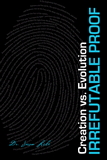
Chapter 40
Evan Jamieson, Hydrometallurgy
As the years have passed, there were many questions posed regarding the validity of creation. However, these have always been answered to my satisfaction and have strengthened my foundations.
is a research chemist for Alcoa World Alumina, Australia. He holds a B.App.S. (postgraduate degree) in applied chemistry from Curtin University and a Ph.D. in hydrometallurgy from Murdoch University. He has also served as a consultant scientist and research scientist for several companies in the areas of ceramics, battery cell design, and mineral processing.
I can’t remember a time when I did not believe in God or Jesus Christ as a personal Savior. The creation/evolution debate was quite different, however.
The subject used to be a “non-issue” for the church I attended. If anything, the predominant belief was the “gap theory,” but not much was said about the issue at all. This and my strong interest in science led to the inevitable combination of both theories, and another “theistic evolutionist” or “progressive creationist” was born. However, while studying for my Tertiary Admittance Exam (years 11 and 12), I couldn’t help but notice the religious passion that teachers put into their discussions on the theory of evolution. In fact when I raised some scientific inconsistencies (e.g., polystrate fossils, young earth ages for non-radioactive dating methods, and complications for Miller’s “chemicals of life” experiment), often there was an angry reaction and feeble, if any, explanations. I once asked how sedimentary rocks were dated and was told by “indicator fossils.” When I followed with “how were indicator fossils dated,” I was told, “by the rock formations they are found in.” Try as I might, the teacher could not see that this was circular reasoning!
The lack of credible answers made me quite skeptical of the theory of evolution.
The lack of credible answers made me quite skeptical of the theory of evolution. After all, it wasn’t an obscure theory; it was basically accepted worldwide and had been studied for many years. Simple and obvious questions should have been given simple and obvious answers—so where were they? About the same time I was noticing inconsistencies between the Bible and the theory of evolution. Some examples include:
-
How could a God of love declare everything as “very good” (Gen. 1:31) if He had created man by such a cruel and callous method as evolution?
-
The Bible clearly teaches that from man’s sin came death (Rom. 5:12; 1 Cor. 15:21). Evolution teaches that by death came man.
-
Jesus appears to accept Genesis literally and clearly quotes from it (Matt. 19:4).
By the time I went to university, I was a budding creationist. I was expecting to encounter serious scientific argument from the “enlightened ones,” but what I found was more of the same. One lecturer told me that man was evolving because we are smarter than our ancestors were. He went on to say that we would all grow larger ears (for learning) and would one day lose our toes because we all wore shoes. Now the irrelevance of this was astounding and I pointed this out. Accumulated knowledge does not prove increased intelligence (it is a product of cooperation), and even people without ear lobes can hear, and therefore learn (i.e., small ears are not an indication of stupidity). As for your toes, lose them and you have enormous problems adjusting your balance, no matter what type of shoe you wear (it was part of the old and refuted vestigial organ debate).1
Well, instead of a rational debate, I was bombarded with highly emotive statements that included “people who do not believe the theory of evolution as fact have no right to be studying science.” His reasoning was that non-evolutionists lacked rational thinking!
As the years have passed, there were many questions posed regarding the validity of creation. However, these have always been answered to my satisfaction and have strengthened my foundations.
I believe that the Bible is a book of tested or reasonable faith. It declares there is a coming final Judgment of the human soul unless there is a repentance of sin. Christians have faith that Jesus can, will, and has forgiven our sin, if we trust in Him (John 3:16–18, 5:24, 20:23; Rom. 10:9; 1 John 5:13).
If God is God, then what He has said must be true. I believe that if we test it, our reasonable faith will be strengthened (1 Pet. 3:15).
In Six Days
Can any scientist with a Ph.D. believe in the idea of a literal six-day creation? In Six Days answers this provocative question with 50 informative essays by scientists who say “Yes!”
Read Online Buy BookFootnotes
- Jerry Bergman and George Howe, “Vestigial Organs” Are Fully Functional, Creation Research Society Books, Terre Haute, IN, 1990.
Recommended Resources

Answers in Genesis is an apologetics ministry, dedicated to helping Christians defend their faith and proclaim the good news of Jesus Christ.
- Customer Service 800.778.3390
- Available Monday–Friday | 9 AM–5 PM ET
- © 2026 Answers in Genesis


